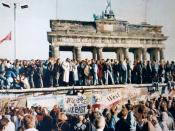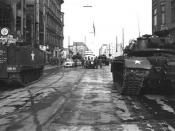"There are many people in the world who really don't understand-or say they don't-what is the great issue between the free world and the Communist world. Let them come to Berlin!" This quote by John F. Kennedy just emphasizes why was Berlin was one of the most important issues and factors during the Cold War. Already second Berlin crisis during the years of 1958 until 1961 didn't change the Cold war rapidly, but it had affected it in way of relationships of the Western allies with Russia and the FRG, but also the relationship between two German states (the FRG and the GDR).
One of the main reasons for the changed relationship between USA and Russia during the Berlin crisis was the presidential election in the USA during this time (8th of November 1960). In these elections, John F. Kennedy had beaten Richard M. Nixon with the closest result until that time, by 0,2%.
Replacement of the war veteran, republican, Eisenhower by the young democrat Kennedy meant also the different handling with their biggest opponent, Russia. While strict Dwight Eisenhower was refusing all attempts of Nikita Khrushchev of driving off the Americans from Western Berlin and recognizing the boundaries of East Germany as he demonstrated during the Geneva conference (1959) and Paris summit (1960), John F. Kennedy was trying to lower the tension by searching for common conclusion in case of Berlin and two German states. Orthodox historians such as Winston Churchill and also revisionists would argue, that Kennedy's acting was inappropriate, because from the view of possible repeating of the history, if Kennedy would continue in acting like this, it would be comparable to the Chamberlains appeasement of Hitler in the year of 1939. The appointing of the first democrat, Kennedy, since the presidential time of Herbert Hoover...


